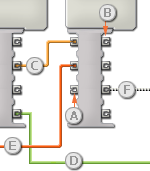This block performs simple arithmetic operations like addition, subtraction, multiplication, and division. The block can also perform absolute value and square root. The input numbers can be typed in or supplied dynamically by data wires.

A Math block dropped into the work area will have an open data hub with two input plugs (on the left) and three output plugs (on the right). The input numbers for the arithmetic equation can be typed in or supplied dynamically by data wires.
Output from the equation will be delivered from the bottommost output plug; connect this plug using a data wire to another block’s data hub. The two output plugs opposite the input plugs allow you to pass the input numbers on to other blocks if this is necessary. (See the Data Hubs section below for more information.)

- Input values can be typed in or supplied dynamically by data wires. The input boxes will be grayed out when data wires are connected.
- The pull-down menu will let you choose from six arithmetic operations you can perform:
- Addition (+) [default]
- Subtraction (-)
- Multiplication (x)
- Division (/)
- Absolute Value (|X|)
- Square Root (√x)
Addition
In this case, the two input numbers will be added together with the sum sent to the output.
Input A + Input B = Output
Subtraction
In this case, the second input number will be subtracted from your first number with the difference sent to the output.
Input A - Input B = Output
Multiplication
In this case, the two input numbers will multiplied together with the total sent to the output.
Input A x Input B = Output
Division
In this case, the first input number will be divided by the second input number with the quotient sent to the output.
Input A / Input B = Output
Absolute Value
In this case, the absolute value of the first input number will be sent to the output
Input A = Output
Square root
In this case, the sqare root of the first input number will be sent to the output.
Input A = Output
Configuring the Math block’s Data Hub
You can control the Math block dynamically by connecting data wires (from other blocks’ data hubs) to the Math block’s data hub.
Open a block’s data hub by clicking the tab at the lower left edge of the block after it has been placed on the work area.

Data wires carrying input information to a block are connected to the plugs on the left side of its data hub. Data wires carrying output information are connected to the plugs on the right side.

[A] Input plug
[B] Output plug
[C] Number data wire (yellow)
[D] Logic data wire (green)
[E] Text data wire (orange)
[F] Broken data wire (gray)
Passing data from the input plug to the output plug
If an input plug has a corresponding output plug (see A above), the input data will pass through from the input plug to the output plug without being changed. In this case, you can only use the output plug if the input plug is connected to an input data wire; connecting an output data wire to such an output plug without a connected input data wire will cause the output data wire to be “broken” (and colored gray).
Data wires carry specific types of data
Each data wire carries a specific type of data between blocks. For example, if a data wire is dragged from a logic plug on a block’s data hub, it can only be connected to a logic plug on another block’s data hub. The chart below shows what kind of data each plug can accept or send out.
Data wire colors
Data wires are identified with specific colors: wires carrying number data are colored yellow, wires carrying logic data are colored green, and wires carrying text data are colored orange.
“Broken” data wires
If you try to connect a data wire to a plug of the wrong data type, the data wire will be broken (and colored gray). You will not be able to download your program if a data wire is broken.
If you click a broken wire you can read why it is broken in the small help window in the lower right corner of the work area.
Data must be within the possible range of the plug
If an input data wire transmits a value outside the possible range of the plug it is connected to, the block will either ignore the value or change it to a value within its range. For plugs that allow just a few input values (example: just 0, 1, or 2), the plug will ignore the input if a value arrives outside its range.
For plugs that accept larger input ranges (example: 0 – 100), the plug will force any input outside its range to fit. For example, if a Move block’s Power plug receives an input value of 150, the block will change the input value to 100 (i.e., a number within the Power plug’s range).
This chart shows the different characteristics of the plugs on the Math block’s data hub:
| Plug | Data Type | Possible Range | What the Values Mean | This Plug is Ignored When... | |
| A | Number | -2147483648 - 2147483647 | Left operand | Negative numbers will output '0' for the Square Root operation | |
| B | Number | -2147483648 - 2147483647 | Right operand | ||
| Result | Number | -2147483648 - 2147483647 | Result of operation |